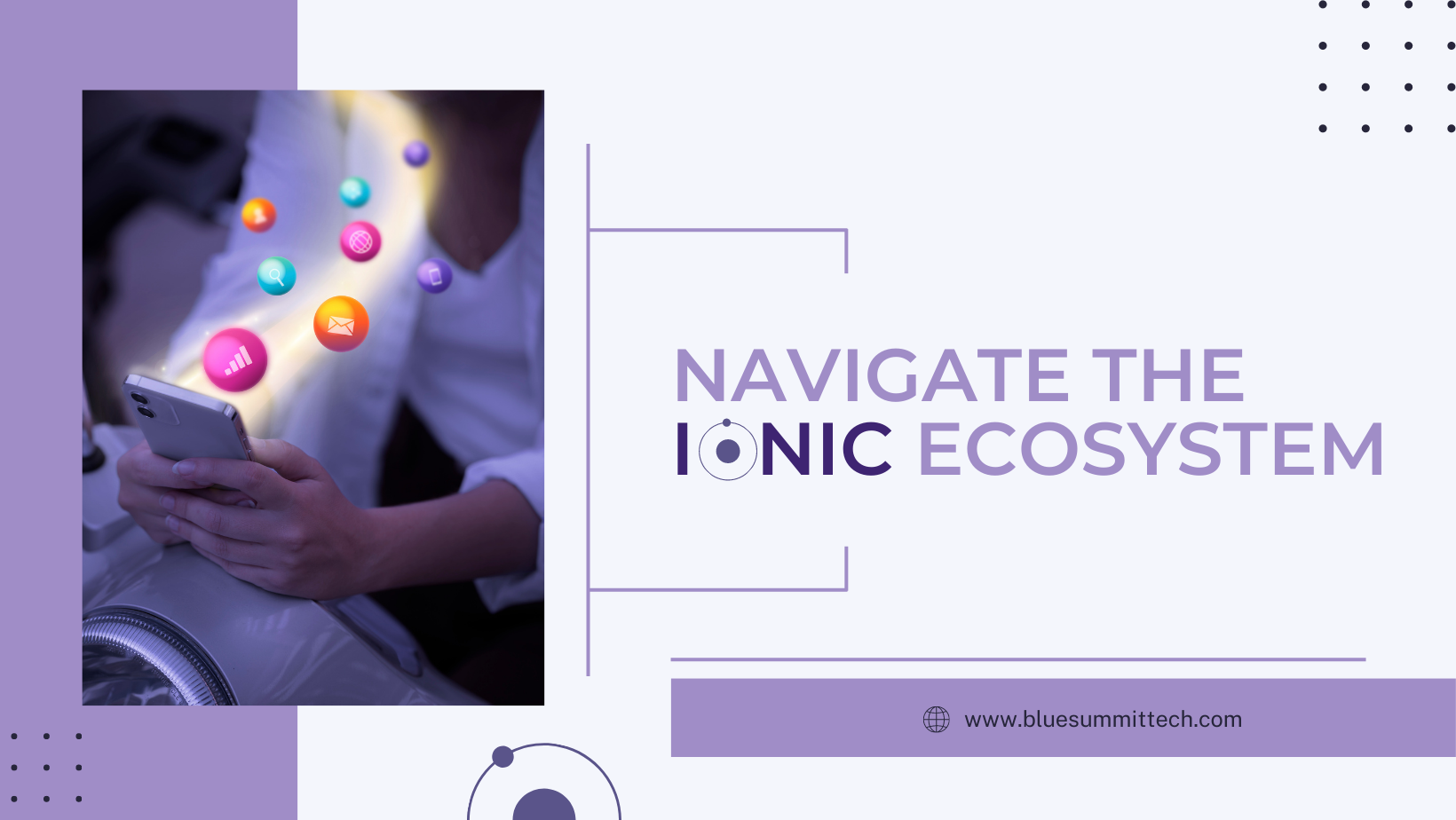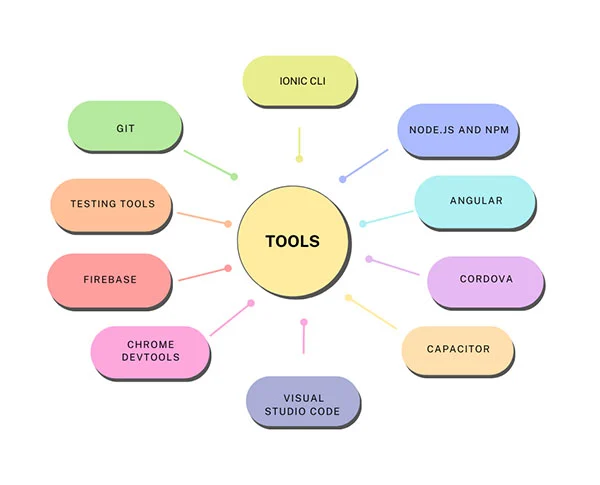
Posted on Wednesday, May 17th, 2023
The Future of Ionic Development: What to Expect in the Years to Come
In the rapidly evolving landscape of mobile and web development, staying ahead of the curve is essential. Ionic, a popular open-source framework, has emerged as a frontrunner in the realm of hybrid app development. With its robust capabilities and flexibility, Ionic app development has captured the attention of developers worldwide. As we look towards the future, it becomes imperative to explore the exciting possibilities that lie ahead for Ionic development. In this blog, we will delve into the key trends, advancements, and innovations that we can expect in the years to come.
Factors responsible for growing popularity of Ionic Development
In the years to come, it is likely to continue to grow in popularity. This is due to a number of factors, including:1. Increasing popularity of hybrid mobile apps
These are apps that are built using web technologies, but they can be installed on mobile devices like native apps. This makes them a more cost-effective and time-efficient way to build mobile apps.2. Growing demand for cross-platform apps
These are apps that can be used on multiple platforms, such as iOS, Android, and Windows. This makes them a more attractive option for businesses that want to reach a wider audience.3. Increasing availability of resources for Ionic development
There are a growing number of tutorials, courses, and libraries available for Ionic developers. This makes it easier for developers to learn and use Ionic.As Ionic continues to grow in popularity, it is likely to become a more important tool for mobile app development. Businesses that want to stay ahead of the curve will need to consider using Ionic to build their mobile apps.
Tools and Techniques Used in Ionic Development

1. Ionic CLI
The Ionic Command Line Interface is a powerful tool that allows developers to create, build, test, and deploy Ionic applications. It provides a range of commands for generating components, managing dependencies, and running development servers.2. Node.js and npm
It is an open-source JavaScript runtime that allows developers to execute JavaScript code outside of a web browser. npm (Node Package Manager) is a package manager for Node.js that enables developers to install and manage the dependencies required for Ionic projects.3. Angular
Ionic is built on top of the Angular framework, a widely-used JavaScript framework for building web applications. Angular provides powerful features for data binding, component-based architecture, and modular development, making it an integral part of Ionic development.4. Cordova
Apache Cordova (formerly known as PhoneGap) is a platform that enables developers to build native mobile applications using web technologies. This is used in conjunction with Ionic to package and deploy Ionic applications as native mobile apps for iOS, Android, and other platforms.5. Capacitor
This is a modern alternative to Cordova that provides a cross-platform runtime for building native mobile applications using web technologies. It is the recommended option for integrating native functionality into Ionic apps and offers better performance and flexibility.6. Visual Studio Code
It is a popular lightweight code editor with robust features for web and mobile app development. It provides powerful tools for writing code, debugging, and integrating with version control systems, making it a favored choice for Ionic developers.7. Chrome DevTools
This is a set of web development tools built into the Google Chrome browser. It offers a range of features for debugging, profiling, and optimizing Ionic applications. Developers can inspect elements, monitor network requests, and simulate mobile device behaviors using the device toolbar.8. Firebase
It is a comprehensive platform provided by Google for building and deploying web and mobile applications. It offers a variety of services, including authentication, real-time databases, cloud storage, and push notifications, which can be easily integrated into Ionic applications.9. Git
It is a widely-used distributed version control system that enables developers to track changes to their codebase, collaborate with team members, and manage code repositories. It is crucial for maintaining code integrity and facilitating seamless collaboration in Ionic development projects.10. Testing Tools
Ionic developers often utilize testing frameworks and tools to ensure the quality and reliability of their applications. Popular options include Jasmine and Karma for unit testing, Protractor for end-to-end testing, and Ionic's own testing utilities, such as Ionic Testing Utilities and Ionic Mocks.Upcoming Trends in Ionic App Development
As the world of technology is constantly evolving, and the future of Ionic development is bound to be shaped by a number of factors. Let’s take a look at some of the trends and changes that are likely to influence Ionic development in the years to come.Continued Growth and Adoption
One thing that is certain is that Ionic is going to continue to grow and be adopted by more and more businesses and developers. The framework has already gained significant traction in the development community, and this trend is only going to continue as more developers discover its benefits.One of the reasons for this growth is the fact that Ionic is incredibly versatile. It can be used to develop applications for iOS, Android, and the web, which makes it a great option for businesses that want to reach a wide audience. Additionally, it is easy to learn and use, which means that developers can get up and running quickly.
Emphasis on Performance
As mobile devices become more powerful and users become more demanding, the emphasis on performance is likely to become even greater in the coming years. This means that developers who work with it will need to focus on creating applications that are fast and responsive.To achieve this, developers may need to focus on optimizing the code that they write and ensuring that it runs efficiently. They may also need to leverage tools and techniques that can help them improve the performance of their applications, such as lazy loading and code splitting.
Integration with Other Technologies
The world of technology becomes more interconnected, and it's likely that Ionic will need to be integrated with other technologies to remain relevant. This could include integration with popular content management systems like WordPress and Drupal, or with other frameworks like React or Angular.Furthermore, the integration of Ionic with emerging technologies like blockchain or virtual reality could help to make it even more valuable for businesses that want to stay ahead of the curve.
Rise of Progressive Web Apps
Progressive web apps (PWAs) are web applications that can be installed on a user's device and used offline. They offer a number of benefits over traditional web applications, including improved performance and the ability to work across multiple platforms.As the popularity of PWAs continues to grow, it's likely that developers who work with Ionic will need to focus on creating applications that are optimized for this new paradigm. This could involve leveraging tools like service workers and web manifest files to create applications that can be installed on a user's device and used offline.
Increased Focus on Design
In the past, Ionic was primarily known for its functionality and ease of use. However, as the importance of design continues to grow, it's likely that developers who work with Ionic will need to focus more on creating applications that are visually appealing and engaging.To achieve this, ionic developers may need to work closely with designers to ensure that their applications are optimized for the user experience. This could involve creating custom components, leveraging popular design frameworks like Material Design, or using tools like Sketch or Figma to create high-fidelity designs.
Adoption of Ionic Capacitor
Ionic Capacitor, introduced as the successor to Cordova, has garnered attention for its enhanced performance and native functionality. Capacitor bridges the gap between web technologies and native SDKs, empowering developers to access device features and APIs effortlessly. As Capacitor continues to evolve, we can expect increased adoption and support within the Ionic community. This shift will open up new avenues for creating sophisticated and feature-rich applications, further solidifying Ionic's position as a dominant player in the hybrid app development space.Embracing Cross-Platform Development
Ionic's strength lies in its ability to develop applications that seamlessly run on multiple platforms, including iOS, Android, and the web. With the growing demand for cross-platform solutions, Ionic is poised to play a vital role in the future of mobile app development. As the framework continues to mature, we can anticipate improved tooling, performance optimization, and streamlined development workflows, making cross-platform development even more accessible and efficient.Growing Community and Ecosystem
Ionic boasts a strong and thriving community of developers, contributors, and enthusiasts. This vibrant ecosystem fosters knowledge sharing, collaboration, and the development of new plugins and extensions. As the community continues to expand, we can anticipate a wealth of resources, tutorials, and support for developers, empowering them to build robust Ionic applications and tackle complex challenges effectively.Skills of Ionic Developers
To cope with the changes and stay at the forefront of Ionic development, the developers should possess the following skills and qualities:i. Proficiency in HTML, CSS, and JavaScript
Ionic developers need a strong foundation in web technologies as Ionic is based on these languages. They should be well-versed in HTML for structuring web pages, CSS for styling, and JavaScript for implementing logic and interactivity.ii. Knowledge of Ionic Framework
The developers must have a comprehensive understanding of the framework, including its core concepts, components, and tools. They should stay updated with the latest version and features of Ionic and leverage its capabilities to build robust applications.iii. Cross-Platform Development Expertise
They should have expertise in developing cross-platform apps that can run seamlessly on multiple platforms. And need to understand the nuances and differences of various mobile platforms (iOS, Android) and be able to optimize the application's performance and user experience accordingly.iv. Familiarity with Angular
Ionic is built on top of the Angular framework. Therefore, the developers should have a good understanding of Angular concepts and be able to utilize Angular features effectively within Ionic applications.v. Knowledge of Mobile App Design Principles
Developers should be familiar with mobile app design principles and best practices. They should have an understanding of user experience (UX) and user interface (UI) design, and be able to translate design mockups into functional and visually appealing interfaces.vi. API Integration and Backend Communication
They should have experience in integrating APIs and communicating with backend services. They should understand how to consume RESTful APIs, handle data communication, and ensure proper integration between the frontend and backend components of the application.vii. Problem-Solving and Debugging Skills
With the ever-evolving nature of technology, Ionic developers need to have strong problem-solving and debugging skills. They should be able to identify and resolve issues that arise during the development process, perform effective troubleshooting, and ensure the overall quality and stability of the application.viii. Continuous Learning and Adaptability
They should have a thirst for knowledge and a willingness to adapt to changes and should actively seek out new tools, frameworks, and best practices in the mobile app development ecosystem. Keeping up with the latest trends and advancements will help them stay ahead of the curve and embrace new technologies as they emerge.ix. Collaboration and Communication
The developers often work as part of a team, collaborating with designers, backend developers, and other stakeholders. They should possess excellent communication skills and be able to effectively communicate their ideas, requirements, and challenges to ensure smooth collaboration and project success.x. Attention to Detail and Quality Assurance
Ionic developers should have a keen eye for detail and a commitment to quality. They should thoroughly test and review their code to identify and fix any issues or bugs. They should also follow coding best practices, implement proper error handling, and ensure the overall stability and performance of the application.Conclusion
The future of Ionic development holds tremendous promise and potential. With its continuous evolution, it is well-positioned to meet the demands of the ever-changing development landscape. As the framework embraces new technologies, enhances cross-platform capabilities, and fosters community growth, developers can look forward to a future filled with exciting possibilities.Blue Summit stays abreast of the latest trends and advancements in Ionic, and our developers always remain updated to create cutting-edge applications that redefine the boundaries of mobile and web development. So, let's embark on this journey together and shape the future of Ionic development.
To know more about our Ionic services, refer to our blog and start your inquiry today.
Blue Summit has collaborated with OdiTek Solutions, a frontline custom software development company. It is trusted for its high service quality and delivery consistency. Visit our partner's page today and get your business streamlined.
REFER TO OTHER RELEVANT CONTENTS

Ionic Mobile App Development
Ionic is a totally free and open-source framework that makes it easy to create strong SDKs that are ideal for highly interactive and effective apps. It offers a wide variety of information, tools, and services that facilitate the creation of hybrid apps. The apps may...
read more







